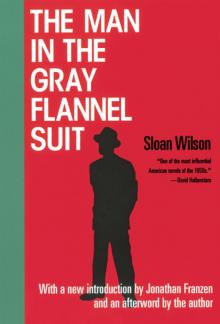- Home
- Sloan Wilson
A Summer Place Page 21
A Summer Place Read online
Page 21
She wanted more than anything to have John attend the wedding; she wanted him there so much that she telephoned him at Colchester Academy the moment the date was set. “Ken and I are getting married,” she said, her voice tight. “We want you to come.”
“I have examinations,” he said, without inquiring about the date. Apparently, every contact she had with him worsened matters, because shortly after that she got a brief note from him saying that he had got a music scholarship and wouldn’t need any financial help from her any more. The checks she sent him after that were not cashed.
Molly also declined to come to the wedding, but Ken had assumed that Helen wouldn’t let her accept. The only person who seemed happy was Carla, who acted as though a big sister were getting married to an old beau long beloved by the family. She asked if she could be a bridesmaid, and delightedly tried on dress after dress.
Ken arranged for his seventy-five-year-old mother, who still lived in Nebraska, to come. Old Mrs. Jorgenson agreed to accept plane fare when he told her it would really mean a great deal to him to have her at the church. Bernie Anderson and his wife said they’d arrive “with bells on,” and sent a case of champagne with which to celebrate.
While the preparations were being made Sylvia found herself making comparisons with her first wedding, and the more she remembered about it, the more horrified she became at herself. Her father’s business had not been going well, but on her mother’s insistence he had borrowed a great deal of money to make the wedding “a proper affair.”
Oh, it had been proper all right. The invitations had been engraved on the most expensive paper, and the gowns for all the bridesmaids had come from Paris. Sylvia had worn “white for purity,” and Bart had ridiculed her. It had been very sophisticated to assume that no bride was pure, but there had been more to it than that, Sylvia realized: Bart had known perfectly well from the beginning that she didn’t love him. He had got hopelessly drunk the day before the wedding, and had asked her if she was in love with someone else, if she had ever loved anyone else, and she had said no, thinking that was the truth, almost. Bewildered by her coldness toward him, Bart had boasted of his virility. At one time or another, he had slept with every one of the bridesmaids she had picked, he had said, standing before her on the day before the ceremony, so drunk he could hardly stand up. They were all Pine Island girls, and the Hunters always exercised the droit du seigneur, he had claimed, and Sylvia had realized that in a sense he was right; he probably had slept with most of her bridesmaids, or come close to it. The old rules about not “getting serious” and not “going all the way” had applied only to teen-agers, and the parties on the island had been getting wilder lately.
The knowledge of this had made her first wedding a parody; it had been necessary to be very sophisticated, to smile as she leaned on the arm of her poor tired father. The smile had been hard to maintain as she followed her procession of pretty bridesmaids down the aisle to stand beside Bart at the altar. It had been difficult to look amused when he dropped the ring, obviously because he was drunk, not nervous.
In the middle of the night before her second wedding Sylvia covered her face with her hands when she remembered this. Suddenly all Bart’s troubles seemed her fault—she had caused his drunkenness, and the misery of the children; she had put Ken through a special kind of hell; and she had been evil from start to finish, she thought. Smothering her face in her pillow, Sylvia started to cry.
But the second wedding on January 31 was much different. Her only bridesmaid was Carla, a chubby young girl in a new white dress; and instead of leaning on the arm of her debt-worried father, she now had the strong arm of Bernie Anderson, who had gone out and licked the world, but who looked a little like her father—yes, there was the same sad kindness in his eyes. And instead of Bart standing stiffly at attention while he swayed by the altar like a tin soldier too loosely attached to its base, there was Ken, big and relaxed, with a quiet smile upon his face.
Except for Bernie’s wife, Rachel, and Ken’s mother, no one was sitting in the church, and the rows of empty pews seemed to extend back to infinity through the shadows; the darkened ceiling seemed to arch up to the sky itself. Behind the altar there were fourteen candles and a golden cross. On one stained-glass window was a poorly rendered picture of a shepherd and a lamb, and on another was Christ on a cross, his face tortured and compassionate. All this appeared beautiful to Sylvia. There was no music, and she felt none was needed.
An old minister with a tired face stood on a raised platform near the altar, towering above Ken and Sylvia. Ken’s mother started to weep, emitting tiny snuffling sounds, like a small animal hurt. Rachel Anderson put a reassuring hand on the old lady’s shoulder.
“Dearly beloved,” the minister said, reading from a small red prayer book, “we are gathered here in the sight of God, and in the face of this company, to join together this Man and this Woman in holy Matrimony; which is an honourable estate, instituted of God…”
The ceremony didn’t last very long. The minister’s voice was mellifluous but subdued; outside the church a fire engine whined in the distance. Ken glanced at Sylvia. She was pale. When she said, “I do,” her voice was clear but faint, contrasting strongly with Ken’s basso profundo “I do,” which echoed through the church like an organ note.
“Let us pray,” the minister said.
After the wedding Sylvia, Ken and Carla went to live in France, where Ken had work to do with Bernie Anderson. A year or two abroad would do them both good, he said, and the children might have grown up enough to feel differently by the time they got back. Sylvia felt bad because she had no source of news concerning John; he might be terribly sick and she might not hear about it in time to get there, and she was sure he would want her if he fell ill. She had nightmares of his dying and calling for her. Before sailing she had premonitions of disaster so acute that she telephoned Colchester Academy to see if he was all right. The absence of news about his daughter bothered Ken too, and acting on a sudden inspiration, he wrote Mr. Caulfield, and Miss Summerfield, the headmistress of Briarwood Manor, asking to subscribe to the school newspapers, the yearbooks, the literary magazines—in short, any publication in which the children’s names or pictures might appear. Soon after they got to their apartment in Paris, a stack of these materials arrived, and more came every month. From the Colchester Academy Arrow they learned, to their surprise, that John, who was then in his second year at the school, had become a member of the boxing team, the pianist and singer for the school band (“Say, Bing and Frank, move over!” a campus gossip columnist wrote), and that he was on the dean’s list, with top marks. Molly wasn’t mentioned much in her school newspaper, but a copy of the Briarwood Literary Review which arrived in March 1955, after Ken and Sylvia had been in France three months, carried a small poem by Molly Carter. It read, Ken found to his astonishment, as follows:
NO
BY MOLLY CARTER
Sometimes I do not want the world to know
That I exist.
I want to see but not be seen
Like gulls in mist.
I envy arctic things upon the snow,
White bear, the fox.
In jungles I would like to be pure green
And gray on rocks.
I know some people want to be admired
Or to be kissed,
But I find too much heartache is required. Do not insist.
“Isn’t that an awfully good piece of verse for a girl her age to write?” Ken asked Sylvia.
“Don’t forget that she’s almost sixteen now,” Sylvia said. “Weren’t you writing love poems in Latin when you were only a little older?”
“Yes,” Ken said bewilderedly, “but they weren’t that good, and anyway, I never wrote a poem called ‘No.’ All mine said ‘Yes.’”
Sylvia laughed. “Molly’s a girl,” she said.
Chapter Twenty-Two
MOLLY WROTE A LOT of verse that year. It was e
asier for her to say things she felt deeply in that impersonal way than in letters. At boarding school she was a solitary child and all sorts of things were happening which disturbed her.
In the first place, there was the matter of popularity. Everyone kept saying how important it was to be popular, especially at the dances the school held once a month in conjunction with Teaberry Academy, a boys’ boarding school in a nearby Virginia town. To Molly these dances were terrifying occasions. It wasn’t that she was a wallflower, far from it. There was always a procession of boys waiting to cut in on her. It was easy to make friends, but the difficulty was in keeping them, in overcoming her shyness. When dancing, Molly held herself stiffly erect in the boy’s arms, and although she learned to make small talk, her voice sounded mechanical. When, as sometimes happened, a boy tried to squeeze her too tight, or allowed his hand to move around to the side of her breast, she had all she could do to keep herself from breaking away in panic. Almost always the boys kept telling her how pretty she was, how beautiful, how absolutely terrific, and she was never sure how to reply. At first she thought modesty demanded denials, and she said, “Oh no, I’m not,” or, “Oh, go on,” but that sounded silly. “Thank you,” she ended up by saying, “thank you very much,” and she didn’t realize how cold she made that sound.
Although there were always plenty of new boys to dance with her, they didn’t come back many times, and this hurt Molly. There was one earnest boy with glasses who was able to quote A. E. Housman’s poems, which she had been studying, and she liked to talk to him; but he was one of the ones whose hands kept straying toward her breast when they danced, and conversation with him soon became impossible. Even when they sat out dances together he seemed to be under great emotional stress, and it wasn’t long before he began avoiding her, the way most of the others did. Once at a dance she heard one boy say to another, “Sure, she’s a knockout, but all ice.”
Girls didn’t like Molly, either. They thought her stuck-up, because of both her looks and her grades, which usually were the best at the school. She rarely laughed and never joined in dormitory bull sessions about “boys and stuff like that.” Her paleness, the delicate bone structure of her face, her habit of holding herself so erect, and her almost constant silence made her appear to her classmates to be aristocratic and aloof. As Ken saw in her school yearbook, her nickname was “the Countess,” and as he guessed, it wasn’t meant to be kind.
So Molly stayed by herself, studying, reading far more than her courses required, and pouring out letters to John. When she began writing poetry she sent him a few restrained verses, and his letters of appreciation were enthusiastic. Gradually she began mailing him everything she wrote. The only trouble was it embarrassed her to think of some of the poems which dealt, however mildly, with love. When John wrote her that he would like to hitchhike to Virginia to see her, and that he was sure a meeting could be arranged without her mother finding out, she became terrified. She was sure she would blush piteously when she saw him, and would stammer. Furthermore, there was no reason to believe that he would like her after the first meeting any more than the other boys did. He might go away disappointed, and then their correspondence, the greatest pleasure in her life, indeed, the only one, would stop. Still another danger was that she herself might be disillusioned by John, now that they had both grown older. As things were, she imagined him as tall, handsome and kind, perfect in every respect, and she suspected he might turn out to be something else. She wrote him that the school had very strict rules against male callers, it was practically a nunnery, she said, and there would be all kinds of trouble if he came. A little later she sent him the poem entitled “No,” which was published in her school literary magazine.
John was hurt and puzzled by her refusal to see him, but a little relieved, for though his complexion had cleared up during the past year, it still wasn’t perfect, and perhaps it would be better after all for Molly not to see him right away. He liked the poem. It sounded almost like a song, he thought, and when he reread it, the beginnings of a melody seemed to be stirring deep down in him, teasing him to try to write it down.
John’s interest in music was increasing. He practiced on the piano two hours a day, and played in the school band at all the dances. One small advantage of this was that he didn’t have to dance. In spite of his acute sense of rhythm and the inherent elegance of movement which he shared with his father, John, even at sixteen, found that he got so confused when he danced that his feet tangled. The girls’ perfume bothered him; the very idea of their being so close to him threw him into a panic; their soft dresses and the feeling of his hand on a girl’s shoulder or back, this was all too much to be borne calmly. Dancing inspired a rush of thoughts and emotions which was so overpowering it rendered him as thick-tongued and stumble-footed as though he were drunk.
But at the piano John was a different person. There he was no longer earthbound; he could glide and fly and soar. He could make love to a girl on the piano, very delicately with the little high notes, and passionately with the pounding basses, and often when he put his head back and sang, the dancers stopped and gathered around to listen. His clear tenor voice was so charged with emotion that it made the tired words of old Tin Pan Alley songs flash into life. His singing appeared effortless, as though all he had to do was just sit there and let the music pour out.
Playing at the dances John often forgot his audience entirely. When he looked up after finishing a song and saw the semicircle of faces around him, he sometimes blushed, as though he had been caught naked. The girls from Miss Arden’s Academy in Hartford were always teasing John, trying to get him to dance. They said they bet he was a marvelous dancer, but none ever found out, because John was too embarrassed to try.
For months John had been trying to compose a song. He had sat up half the night in his dormitory after the lights were supposed to be out, holding a flashlight under a blanket, staring at the neatly lined music paper and painstakingly writing down notes. The results were so bad that he had given up, but Molly’s poem “No” teased him to try again.
For two weeks he worked on his song in every spare moment, and when it was finished it was a long way from great, he was quite aware, but it wasn’t a bad little tune. The only trouble was that Molly’s words didn’t seem to go very well with it—it bothered him to sing or to write as though he were Molly; he wanted to sing about her. Hoping she wouldn’t mind, he changed the words a little. He wasn’t as good at writing verse as she was, and for a person who still signed his letters to her “Sincerely yours,” the words were pretty embarrassing for him to set down; but in a song he hoped such talk was permissible. This is what he wrote:
NO
LYRICS BASED ON POEM BY MOLLY CARTER MUSIC BY JOHN HUNTER
My Molly doesn’t want the world to know
Her charms exist.
She wants to see but not be seen
Like gulls in mist.
She envies arctic things upon the snow,
White bear, the fox;
She envies jungle birds whose hue is green
Or gray on rocks.
My Molly doesn’t want to be admired
Or to be kissed.
Of me I fear she’d soon get sick and tired
For I insist.
John blushed painfully when he reread it, and he became enraged when Dick Woller caught him singing it at the piano. For weeks he polished the music, putting off the decision of whether to send it to her, but finally, in March of 1955, he mailed it.
Molly was both embarrassed and pleased to find he had set her verse to music. Early one Sunday morning she crept into the common room at her school when no one was there, and sat down at the piano. She couldn’t play well, and it took her an hour to pick out the tune with two fingers. After she had caught the melody she ran through it ten or twelve times. Played with two fingers, it had its limitations, but she thought it sounded pretty good.
Chapter Twenty-Three
; THAT SPRING Helen decided to satisfy a lifelong ambition and buy a Cadillac. There was no reason why she shouldn’t, her mother said. After all, she hadn’t yet done a thing to celebrate her freedom from Ken, and if anyone had earned a Cadillac, God knew she had.
Old Bruce was commissioned to buy the car. He had always prided himself on being able to purchase anything cheaper than anyone else could, especially automobiles, and he began touring every Cadillac garage in the Buffalo area. He and his wife and daughter read all the brochures available, and spent their evenings discussing the relative merits of Fleetwoods, Eldorados and the other models. Helen had a clear idea of what she wanted: the biggest and most impressive limousine made, but she felt she couldn’t say that. When Bruce drove smaller models up to the house to demonstrate, she said, “Don’t we need more room, Dad? I mean, some day we might take a long trip.”
Finally Bruce found the exactly right car, an immense black limousine which had been used by an undertaker to carry mourners in funeral processions. The undertaker himself had recently died, and the car was only a year old, a much better buy, Bruce said, than a new one, and after all, it had hardly ever been driven at more than twenty miles an hour.
Helen and Margaret were ecstatic. Sitting on the soft gray upholstery of its back seat, they felt like duchesses. The car also had a marvelous device, a telephone connecting the rear seat with a small speaker over the driver’s head. Margaret, who had always been a zealous back-seat driver, found it a joy to sit comfortably back with the telephone at her lips, a great improvement over the old days, when she had had to lean forward and raise her voice when she wanted to berate her husband. Bruce enjoyed the telephone too. The second day they owned the car, he took it back to the garage “for a checkup” and had a switch installed beneath the little speaker. It gave him a wonderful feeling to let Margaret talk for a few minutes and then, with a touch of a finger, to shut her off. When he didn’t answer her through the mouthpiece attached to the dashboard in front of him, she spoke loudly enough to be heard without the telephone, but Margaret had long been used to one-way conversations with her husband, and if he just nodded his head a little from time to time, the secret switch protected him from most of her comments.

 A Summer Place
A Summer Place Pacific Interlude
Pacific Interlude Man in the Gray Flannel Suit
Man in the Gray Flannel Suit Ice Brothers
Ice Brothers